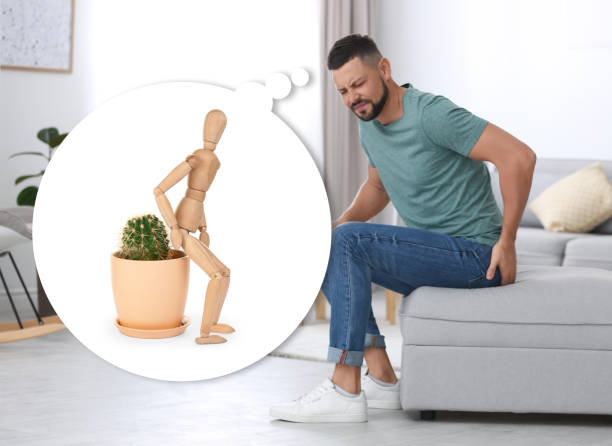Dealing with piles (also known as hemorrhoids) can be uncomfortable and confusing. Many people are unsure about whether surgery is the only solution. In reality, there are several ways to manage and treat piles without surgery.
Nearly 50% of people over the age of 50 experience hemorrhoids at some stage in life. Most cases can be managed with simple and effective non-surgical methods.
At Dr. Gaurav Gangwani’s clinic, we focus on treatments that are safe, convenient, and suited to your individual needs. Let’s go through the details of piles treatment without surgery and explore various non-surgical treatment options for piles.

What Are Piles?
Piles are swollen veins in the rectum and anus that can cause itching, pain, bleeding, and discomfort during bowel movements. They are common and can affect anyone. Factors that may increase the chances of piles include:
- Constipation and straining during bowel movements
- Eating a low-fiber diet
- Sitting for long periods
- Pregnancy and childbirth
- Sedentary lifestyle
While the severity can differ from person to person, many cases do not require surgical procedures.
Why Choose Piles Treatment Without Surgery?
Many patients prefer non-surgical approaches due to the following reasons:
- Less discomfort – No cuts, stitches, or long hospital stays.
- Quick recovery – Most people return to routine activities soon after treatment.
- Safe and effective – Advanced non-surgical techniques provide long-lasting results.
- Cost-friendly – Avoiding surgery reduces medical expenses and downtime.
Non-Surgical Treatment for Piles: Available Options
When you consult us, we assess your condition and recommend the best option. Here are the most commonly used non-surgical treatments for piles:
1. Lifestyle Modifications
Simple lifestyle changes are the first line of management and can significantly reduce symptoms:
- Include fiber-rich foods such as fruits, vegetables, and whole grains
- Drink 8–10 glasses of water daily
- Exercise regularly to improve digestion and blood circulation
- Avoid sitting for long stretches
- Maintain healthy bowel habits and avoid straining
2. Medications
Doctors may prescribe ointments, creams, or suppositories to ease itching and swelling. Pain relievers and stool softeners are also helpful in making bowel movements easier and less painful.
3. Hemorrhoidal Artery Embolization (HAE)
Hemorrhoidal Artery Embolization (HAE) is a non-surgical option for treating internal hemorrhoids. The process works by cutting off the blood flow to the hemorrhoids.
An interventional radiologist does HAE by inserting a tiny tube, called a catheter, into an artery, usually through the wrist or upper thigh. The radiologist then injects small particles to block the arteries that feed the hemorrhoids. This blockage causes the hemorrhoids to shrink.
4. Sclerotherapy
In this method, a special solution is injected into the hemorrhoid, causing it to shrink. It is a simple and effective option with minimal discomfort.
5. Laser Hemorrhoidoplasty (Laser Ablation)
Laser Hemorrhoidoplasty is a modern, minimally invasive procedure that uses targeted laser energy to shrink hemorrhoidal tissue. Performed under local anesthesia, it offers a precise treatment with reduced pain and a quicker recovery.
6. Other Minimally Invasive Procedures
Depending on the condition, advanced minimally invasive treatments may be recommended. These procedures are safe, effective, and require little to no downtime.
How Effective Are Non-Surgical Treatments?
For many people, non-surgical methods bring lasting relief when combined with healthy habits. Severe or complicated cases may still require surgery, but early treatment often prevents that stage. The effectiveness depends on the grade of piles and how well lifestyle changes are maintained after treatment.
Benefits of Non-Surgical Treatment
- No hospital stay required
- Lower risk of complications
- Minimal or no scarring
- Faster return to work and daily routine
- Less anxiety compared to surgical approaches
These benefits make non-surgical treatment options suitable for a large number of patients.
Preventing Piles from Returning
After treatment, it is crucial to maintain healthy habits to avoid recurrence:
- Eat balanced meals with enough fiber
- Stay hydrated throughout the day
- Avoid straining or sitting on the toilet for too long
- Exercise for at least 30 minutes a day
- Respond promptly to the urge for a bowel movement.
These small changes can significantly reduce the chances of piles returning.
When to Seek Medical Advice
If you experience any of the following symptoms, it is essential to consult a doctor:
- Bleeding from the rectum
- Severe pain or swelling
- Continuous itching or irritation
- Difficulty during bowel movements.
Getting timely medical advice helps in controlling the condition effectively and prevents complications.
Frequently Asked Questions
Can piles go away without treatment?
In mild cases, piles may improve with lifestyle changes and home remedies. However, persistent or severe cases need medical attention.
Is non-surgical treatment safe?
Yes, non-surgical treatments are safe, effective, and widely used. They have minimal side effects compared to surgery.
Which non-surgical treatment is best?
The best option depends on the grade and severity of the piles. Your doctor will guide you after a proper evaluation.
How long does recovery take?
Most non-surgical treatments allow you to resume your daily routine within a day or two.
Conclusion: Take the Right Step Towards Relief
Living with piles can be challenging, but surgery is not always necessary. With piles treatment without surgery and modern non-surgical treatment for piles, you can regain comfort and confidence in your daily life.
At Dr. Gaurav Gangwani’s clinic, we provide advanced treatment methods that are tailored to your specific needs. Book a consultation today and take the first step toward long-term relief and better health.



